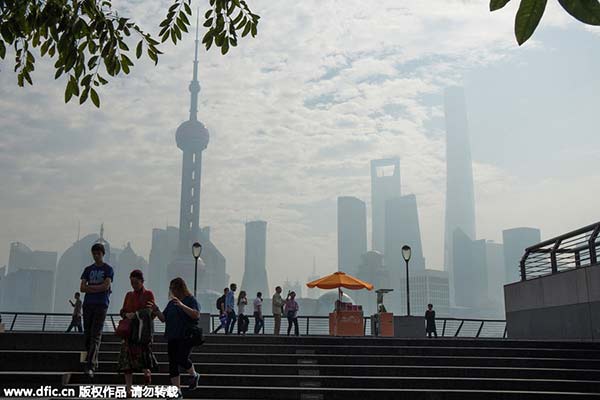Most cities failing air quality standards
Updated: 2015-10-15 12:11
By ZHENG JINRAN(chinadaily.com.cn)
|
|||||||||||
 |
|
A view of the Bund in front of the Oriental Pearl TV Tower under the gray sky in Shanghai on Oct 14, 2015. Shanghai experienced the first day of heavy air pollution with the air quality index rising to 212, the highest level of pollution, at 9 am on Oct 14, 2015, after autumn began on Aug 8, 2015. [Photo/IC] |
About 80 percent of China's 367 cities with real-time air quality monitoring failed to reach national standards on small particle pollution in the first three quarters of the year, a report from Green Peace said on Thursday.
Central China's Henan province had the highest daily concentration of health endangering PM2.5 — particulate matter with a diameter smaller than 2.5 microns — during the period, the report said. Beijing ranked second.
The report released by Green Peace, a nonprofit environmental organization, said it relied on date from the China National Environment Monitoring Center, which updates air quality data hourly on PM2.5 and PM10 concentrations in the 367 cities.
Related: Air pollution in seven Hebei cities ranked among 10 worst
Seven cities from Hebei province filled spots in a list of 10 with severe air pollution during September, the national environment watchdog said.
The Ministry of Environmental Protection released its monthly report on the air quality of 74 major cities on Wednesday, among which seven in Hebei including Hengshui, Tangshan and Shijiazhuang, were listed as having heavy air pollution.
Jinan in Shandong province ranked as the worst with Zhengzhou from Henan province second worst, the report said.
Although residents of the seven cities in Hebei witnessed heavy smog last month, the air quality in the Beijing-Tianjin-Hebei region has seen an improvement.
In the trilateral zone, the concentration of PM2.5 – particulate matter with a diameter smaller than 2.5 microns – has been lowered by 26.2 percent year-on-year, said Luo Yi, head of environment supervision of the ministry.
Related Stories
Smog dampens travelers' holiday spirit 2015-10-08 08:50
Smog persists in North China 2015-10-07 14:49
Smaller cities get help in smog battle in N China 2015-09-20 19:54
China to promote cleaner heating to fight smog 2015-04-29 21:38
New emergency smog plan for capital 2015-03-31 13:33
Today's Top News
UK visit to set course for ties, says Xi
Full text of Reuters' Q&A with Chinese President Xi
Students talk of hopes for Xi's visit
Royal family to gather in strength for Xi
Xi pledges stronger support to rid all Chinese poverty
Xi's trip to herald 'golden decade' for relations
Wanda's Wang again becomes richest Chinese
Ex-NBA star Odom reported critical, Kardashian at his side
Hot Topics
Lunar probe , China growth forecasts, Emission rules get tougher, China seen through 'colored lens', International board,
Editor's Picks

|

|

|

|

|

|






